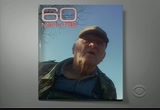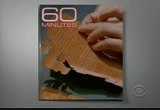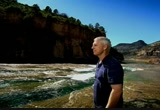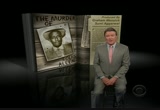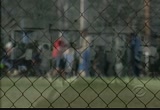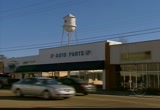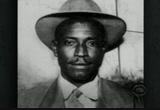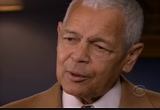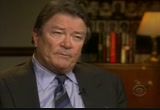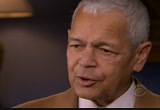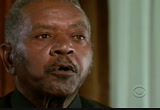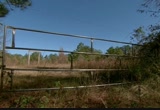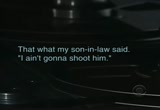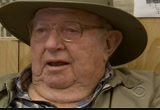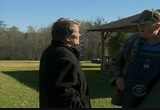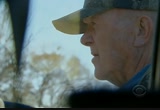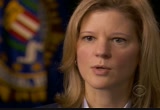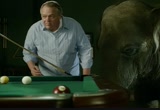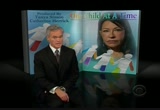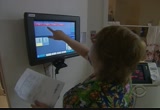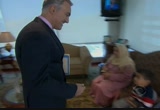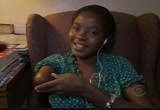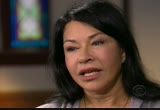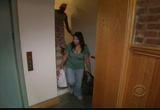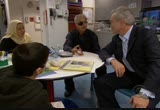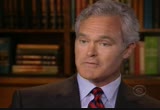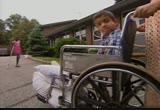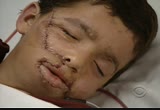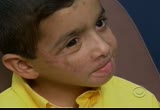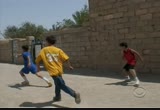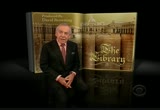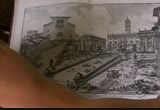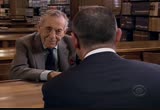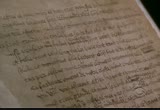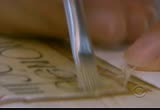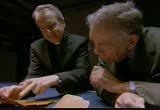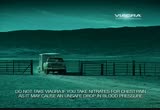tv 60 Minutes CBS July 3, 2011 7:00pm-8:00pm PDT
7:00 pm
captioning funded by cbs and ford-- built for the road ahead. >> the theory that sheriff jones killed louis allen has been in the public domain for quite some time. the fbi would be remiss in our duties if we did not pursue that theory. >> kroft: she's talking about a mostly forgotten but historically significant civil rights killing that has never gone away. my name is steve kroft. we're from "60 minutes" in new york. 47 years later, we found the prime suspect in louis allen's murder very much alive in a mississippi town called liberty. well, you know, sheriff, you could clear this up with a lie detector test. >> well, then, it ain't going to get cleared up.
7:01 pm
>> pelley: elissa montanti is unlike almost anyone we've ever met. with the help of some very charitable american doctors, she's changed the lives of more than 100 kids like this one, a boy from iraq who needed an arm, a leg, and an eye. >> i love you, wa'ad. >> pelley: tonight, you'll follow his transformation.. which is a wonder to watch. >> safer: we're about to visit a place few people have seen firsthand... >> there's about two million printed books. >> safer: two million printed books. ...the vatican library, a vast collection of historic treasures beyond compare. the library's most valued documents go back almost 2,000 years, nearly to the time of st. peter. >> "...the name of god." >> safer: and from the same period, the gospel of luke and
7:02 pm
part of the gospel of john... >> "in the beginning, it was the word and the word was 'god'." >> i'm steve kroft. >> i'm lesley stahl. >> i'm bob simon. >> i'm morley safer. >> i'm lara logan. >> i'm scott pelley. those stories tonight on "60 minutes." the stronger the rapids, the more we loved it. took some wild risks when i was young.
7:03 pm
but i was still taking a risk with my cholesterol. anyone with high cholesterol may be at increased risk of heart attack. diet and exercise weren't enough for me. i stopped kidding myself. i've been eating healthier, exercising more, and now i'm also taking lipitor. if you've been kidding yourself about high cholesterol, stop. along with diet, lipitor has been shown to lower bad cholesterol 39 to 60 percent. lipitor is fda approved to reduce the risk of heart attack and stroke in patients who have heart disease or risk factors for heart disease. [ female announcer ] lipitor is not for everyone, including people with liver problems and women who are nursing, pregnant or may become pregnant. you need simple blood tests to check for liver problems. tell your doctor if you are taking other medications or if you have any muscle pain or weakness. this may be a sign of a rare but serious side effect. lets go... haha. if you have high cholesterol, you may be at increased risk of heart attack and stroke. don't kid yourself. talk to your doctor about your risk and about lipitor. don't kid yourself. that works at the molecular level to help your engine
7:04 pm
run more smoothly by helping remove deposits and cleaning up intake valves. so when you fill up at an exxon or mobil station, you can rest assured we help your engine run more smoothly while leaving behind cleaner emissions. it's how we make gasoline work harder for you. exxon and mobil. >> kroft: five years ago, the fbi announced that it was reopening more than 100 unsolved murder cases from the civil rights era of the 1950s and '60s.
7:05 pm
the goal of the cold case initiative was to try and mete out justice in what seemed to be racially motivated killings that were never prosecuted. not many 50-year-old cold cases ever get solved. memories fade, evidence is lost, witnesses and suspects die or disappear. but that's not the case in the death of louis allen, a mostly forgotten but historically significant murder that helped bring thousands of white college students to mississippi in the "freedom summer" of 1964. as we first reported in april, the murder is still unsolved, but the case has never quite gone away, because the chief suspect is very much alive and walking the streets of a town called liberty. liberty, mississippi, is a small rural logging town not far from the louisiana border. the fbi believes that some people here have been keeping a dark secret for nearly 50 years, from one of the ugliest periods
7:06 pm
in the state's history. >> you will not be allowed to proceed past this point today. >> kroft: it was a time when civil rights activists were beaten and arrested, when state and local politics were controlled by all-white citizens' councils, and when people like louis allen were murdered in cold blood, without redress. you keep a photo of louis allen on your desk? >> cynthia deitle: i do. >> kroft: why? >> deitle: the case bothers me. i feel like we failed, and not just the fbi, but law enforcement. >> kroft: cynthia deitle is a 15-year veteran of the fbi's civil rights division and, until recently, was in charge of the cold case initiative. of the 100 unsolved racially- motivated murders she's been charged with investigating, none has been more promising or frustrating than louis allen's. >> deitle: somebody knows something. some husband came home with bloody clothing. someone got drunk in a bar and said what he was doing last night. someone knows something. >> kroft: but in the early
7:07 pm
1960s, people in and around liberty knew to keep their mouths shut. a violent chapter of the ku klux klan used cross burnings, abductions and murder to enforce the doctrine of white supremacy and to intimidate the black population, most of which lived in shacks with no electricity or plumbing, and were not allowed to vote. civil rights leaders like robert moses, who came south to help them register, were frequently the target of violence. >> bob moses: liberty was not a place that i liked to go. >> kroft: why? >> moses: because it was a place where you weren't safe if you were doing voter registration work. >> kroft: it was in liberty that moses met louis allen, a rough- hewn world war ii veteran who walked proud and was not afraid to stand up for himself. he ran a small timber business, was one of the few blacks in liberty to own his own land, and always wore a hat, which he considered a sign of self respect. he was not the type to seek out trouble; robert moses says it found him.
7:08 pm
>> moses: he was at the wrong place at the wrong time. he saw something that happened, and he was deeply disturbed and affected by that. and so, he had a basic life decision to make. >> kroft: on september 25, 1961, allen was walking past this old cotton gin when he saw something that likely got him killed. louis allen witnessed a powerful state legislator by the name of e.h. hurst shoot and kill an unarmed black man named herbert lee. allen told his friends and family that he and other eyewitnesses had been pressured into lying about the shooting, and to saying that it was self- defense. later, allen decided that he needed to tell the truth. one of the people louis allen told it to was julian bond, who was trying to register black voters in mississippi for the student non-violent coordinating committee. he would later become a legendary civil rights leader. >> julian bond: this was not a self-defense action by the state representative. this was out and out murder.
7:09 pm
that's all it was. but louis allen agreed to lie about that. >> kroft: why do you think he lied? >> bond: he lied because he was in fear of his life. if he had implicated a powerful white man in a murder of a black man, that he was risking his life. >> kroft: did you encourage him to tell the truth? >> bond: i tried to encourage him to tell the truth but, you know, it was like saying, "why don't you volunteer to be killed?" >> kroft: but allen's wife would later testify that "his conscience was clipping him," and he decided to tell fbi agents and the u.s. commission on civil rights what really happened at the cotton gin. this document from fbi files says, "allen changed his story" and "expressed fear that he might be killed." he asked for protection, but none was provided. almost immediately, word began circulating in liberty that louis allen was prepared to change his testimony. >> deitle: he was threatened as a result of the fact that he was going to change his statement and that he did change his statement. >> kroft: and the fbi was notified of those threats? >> deitle: yes. >> kroft: did the fbi do anything? >> deitle: yes.
7:10 pm
we referred that to local law enforcement authorities. >> kroft: it's certainly possible to conclude that local law enforcement people were the ones behind the threats? >> deitle: there is a theory out there that... that speaks to that, yes. >> kroft: in fact, it's been the prevailing theory for some time, although the fbi cannot officially confirm it. there is a 1961 reference in the fbi file to a report that "allen was to be killed, and the local sheriff was involved in the plot to kill him." and we found this 1962 letter from robert moses to assistant attorney general john doar alleging the same thing-- "they're after him in amite county," it says, and makes reference to "a plot by the sheriff and seven other men." he was afraid of the sheriff's department. >> deitle: i think he was, yes. >> kroft: and i think he was afraid of the klan, although they seemed to be sort of the same thing in liberty at this time. >> deitle: i'm not sure i can say that. >> kroft: julian bond was less circumspect. >> bond: the law enforcement,
7:11 pm
you suspected they were members. if you wanted to be a mayor, a city councilman, a county commissioner, the sheriff, if you wanted to be on the legislature, you had to have some connection with the klan. >> kroft: and in the amite county sheriff's department, the person with the best connection was deputy sheriff daniel jones. his father was the "exalted cyclops" of the local klan, and jones himself, according to this fbi document we found, was suspected of being a klan member. jones, who is alive and still resides in liberty, was recently visited by fbi agents who wanted him to take a lie detector test. what was he like? >> hank allen: well, mean. >> kroft: hank allen was 17 years old when his father was killed, and he remembers daniel jones as his main tormentor. he says he watched jones harass and repeatedly arrest his father on trumped-up charges, and one night, beat him outside their home. >> allen: and he had handcuffed him, told him he was under arrest. so daddy asked for his hat. told daddy, "no, you can't go get your hat."
7:12 pm
daddy said, "well, my son is on the porch. can he bring me my hat?" he drawed back, he took a flashlight, and he struck my daddy and broke his jawbone, handcuffed. >> kroft: when he got out of jail, louis allen did something that was unheard of for a black man in mississippi-- he went to the fbi and lodged a complaint against deputy sheriff jones and testified before a federal grand jury. the case was thrown out, and the situation in liberty continued to deteriorate. >> allen: they stopped selling daddy gas in the town. they stopped buying his logs. they just more or less just tried to blackball him. >> deitle: it got to the point, the harassment and just him not being able to survive in liberty, that he decided to leave and to go work in another state. and it's the night before he is due to leave that he is killed. >> kroft: louis allen was ambushed here on a cold night in january 1964 after getting out of his truck to open the cattle gate that led to his property.
7:13 pm
his son, hank, was the one who found him. >> allen: i didn't know why he would park the truck in the middle of the driveway and leave it like that. and i climbed up in the truck. the headlights was real dim. and when i went to step down out the truck, i stepped on something. and that's when i stepped on my... my daddy's hand. he was lying up under the truck. >> kroft: he was killed with two blasts of deer shot to the head. the investigating officer was none other than the newly- elected sheriff, daniel jones, who hank said made it clear to the family why his father had been murdered. >> allen: he told my mom that if louis had just shut his mouth that he wouldn't be laying there on the ground. he wouldn't be dead. >> kroft: you think sheriff jones did it? >> allen: yes, indeed. by all means. if he didn't do it, he was the entrepreneur of it. >> kroft: jones told the newspapers he was unable to find a single clue. how would you characterize the investigation that sheriff jones conducted? >> deitle: he did not develop any fingerprints, any physical evidence, and he never developed any suspects.
7:14 pm
>> kroft: in fact, it's not clear that anyone investigated louis allen's murder until 1994, when plater robinson, a historian at the southern institute at tulane university, began digging into it. >> plater robinson: from day one in liberty, people told me that daniel jones and a "colored man" killed louis allen. >> kroft: robinson has spent 17 years combing through archives and tracking down people to interview. one of them was an elderly preacher named alfred knox. knox told robinson in a 1998 tape-recorded conversation that his son-in-law, archie weatherspoon, was with sheriff daniel jones when allen was murdered. >> alfred knox: my son-in-law went with him. >> robinson: to kill louis allen? >> knox: to kill louis allen. he didn't know where he was going till he got in the car. and he said, "would you pull the trigger? would you shoot him?" he said, "no, i ain't going to do it." that what my son-in-law said. "i ain't going to shoot him.
7:15 pm
you come out here to kill him, you kill him." so he killed him. >> kroft: both knox and his son- in-law took their stories to the grave. but plater robinson says the answer to who killed louis allen can still be found in liberty. >> robinson: a lot of people are dead. but there are still a number of significant people still alive. >> kroft: like who, besides sheriff jones? >> robinson: well, charles ravencraft-- he lives down the road, he's quite healthy. >> kroft: we found charles ravencraft at the liberty drug store presiding over a coffee klatch of old-timers, some of whom were around when louis allen was murdered. >> charles ravencraft: people in this area, they just don't do much talking. >> kroft: for years, ravencraft was sergeant-at-arms of the mississippi legislature, and at the time of louis allen's murder, vice-president of the americans for the preservation of the white race in liberty, a front group for the ku klux klan. ravencraft indicated that he hadn't lost much sleep over louis allen's murder, and told us he had no idea who killed him. >> ravencraft: no, i don't.
7:16 pm
he lived a lot longer than i thought he'd have lived. that's the kind of fella he was. he was a little bit overbearing. i don't think that civil rights had anything to do with it. >> kroft: winbourne sullivan wasn't around when louis allen was killed, but he ran the liberty drug store for 36 years. >> winbourne sullivan: i think there are people who know what happened and who did it, but they're not willing to talk about it. and they won't talk about it. you'll never find out. >> kroft: they told us they don't see much of former sheriff daniel jones these days. he spends most of his time on his property, just off the state highway. we decided to approach him with our cameras concealed on the off-chance he might give something up. after waiting for a half an hour on the porch, he rolled up in an all-terrain vehicle with his wife. my name is steve kroft. how you doing? we're from "60 minutes" in new york. we're down here working on a story, on an old case of yours, and was wondering if you'd have
7:17 pm
some time to talk to us about. >> daniel jones: no, sir, i don't believe so. >> kroft: you don't think so? >> jones: no, sir. >> kroft: the louis allen case? >> jones: yeah, i know what you're talking about. >> kroft: he was polite and cordial. said he didn't want to talk, but he kept on talking. there was some bad blood between you and... and louis, right? >> jones: there was not no bad blood between us. apparently... i'm talking more than i need to, but the truth sometimes has a way of slipping out if you try to keep it covered up. >> kroft: were you in the klan? >> jones: well, i won't answer that. i take the fifth on that. >> kroft: jones confirmed that the fbi had already been there asking some of the same questions. >> jones: i told you i don't care to discuss it, and you just keep coming with your educated approach. >> kroft: no, it's not my educated approach. look, you haven't told me to get off your property. i just... answer me one last question. >> jones: okay, be sure it's the last one. >> kroft: can you look me in the eye and say you weren't involved in it? >> jones: no, sir, i wasn't involved in it.
7:18 pm
>> kroft: well, you know, sheriff, you could clear this up with a lie detector test. >> jones: well, then it ain't going to get cleared up. >> deitle: the theory that sheriff jones killed louis allen has been in the public domain for quite some time. the fbi would be remiss in our duties if we did not pursue that theory. >> kroft: and it's still just a theory, a circumstantial case based on motive, suspicions, hearsay, and the words of dead people. there's no forensic evidence, no murder weapon, no eyewitnesses, and only one fbi agent working the case, part-time. >> deitle: my name is cynthia deitle. >> kroft: at a town hall meeting in nearby baton rouge, deitle tried to shake out some new leads and enlist journalists, activists and students to help the fbi solve the murder. why are you relying on reporters and professors? this is the most powerful law enforcement agency in the country. you have subpoena power. >> deitle: we do. we have resources that we could
7:19 pm
bring to bear on any case. >> kroft: why don't you bring them? >> deitle: they have been. but i've learned, in these cases, that a witness, a family member may be more comfortable talking to you than she would be talking to me. >> kroft: for hank allen, the time to solve his father's killing was 47 years ago. he believes the people who know what happened, black and white, would rather forget it now, and that the wall of silence and the passage of time have granted immunity to those he thinks are responsible. >> allen: here's a guy, goes on living his normal life, enjoying life. but they feel as though we're doing something wrong by saying something about the murder. in other words, "you should be quiet about that. that was in the past." well, it's still in my present and in my future. i have to look at this every day.
7:20 pm
>> cbs money watch update sponsored by: >> mitchell: again. according to "the new york times," the pay of top executives shot up 23% last year to a median $10.8 million. gas has dipped to an average of $3.57 a gallon, down 22 cents in a month. and in hollywood's best opening of the year, the new "transformers" earned more than $97 million. i'm russ mitch mitchell. cbs news. ♪
7:22 pm
♪ you are my sunshine ♪ my only sunshine ♪ you makes me happy ♪ when skies are grey ♪ you'll never know, dear ♪ how much i love you ♪ please don't take my sunshine away ♪ [ male announcer ] as long as there are babies, they'll be chevy's to bring them home. ♪ you know what, tell me, what makes peter peter ? well, i'm an avid catamaran sailor. i can my own homemade jam, apricot. and i really love my bank's raise your rate cd. i'm sorry, did you say you'd love a pay raise asap ? uh, actually, i said i love my bank's raise your rate cd. you spent eight days lost at sea ? no, uh... you love watching your neighbors watch tv ? at ally, you'll love our new raise your rate 4-year cd that offers two rate increases if our current rates go up. ally bank.
7:23 pm
>> pelley: of all the tragedies of war, none are greater than those that involve children. caught in the crossfire or hit by a roadside bomb, children are often wounded, but rarely receive the heroic, high-tech medical care that our soldiers depend on. in march, we told you about a woman in staten island, new york, who has devoted herself to wounded children. elissa montanti has little money and no training in humanitarian
7:24 pm
relief, but against the odds, she has changed the fortunes of more than 100 crippled children, one child at a time. we wanted to see how she does it, so, for four months, we followed elissa montanti on a journey with one child, a nine- year-old from iraq, a boy named wa'ad. this was wa'ad in april of last year, when he arrived in america with his mother, waffa. elissa montanti brought them here after an american soldier told her wa'ad's story. >> elissa montanti: he was walking with his friends and they were kicking a bottle. i think the first child kicked a bottle, and then maybe the second. and then, he kicked it and it exploded. >> pelley: it was a bomb? >> montanti: it was a bomb. >> pelley: the blast shattered his face, tore out his eye, and took away his right arm and left leg. wa'ad would receive treatment for all of those wounds from a network of volunteers and charities that elissa montanti
7:25 pm
has recruited, one by one, over the last 15 years. wa'ad's first stop was at the shriners hospital in philadelphia. shriners has 22 hospitals that provide free care to burned and crippled children. >> oh, you are so strong. >> pelley: wa'ad pushed through physical therapy to strengthen his muscles. >> you're going to be superman. ( laughter ) >> pelley: but slowed down long enough... >> wow, he really gets around well. >> pelley: ...to get fitted for a new arm and leg that the shriners made for him. then, it was a trip to see an ocular specialist, annette kirzrot, who also volunteers for elissa. a prosthetic eye was the first step in improving wa'ad's appearance. >> montanti: happy? >> wa'ad: happy. >> pelley: but the tougher part would be reconstructing his face. >> kaveh alizadeh: wa'ad, how are you, buddy? how you doing?
7:26 pm
>> pelley: that was the challenge for plastic surgeon kaveh alizadeh. he's a long island volunteer recruited by elissa. >> alizadeh: so, there's this increasing pool of people that get drawn into her world. and if you have... if you're lucky or unlucky enough to be excited about this stuff, you get pulled in. can you blow up your cheeks? >> pelley: when you first approach a hospital or a doctor to ask them for, potentially, hundreds of thousands of dollars in free medical care, what's your pitch? what do you tell them? >> montanti: i tell them this true story. here's a child that's... that's battered. i just tell them the reality. i expect them to help. i'm grateful, because they don't have to help. but i expect that they would, because... how could you not? >> pelley: after the earthquake hit in haiti, she went to the island and brought back three girls who lost limbs.
7:27 pm
elissa's work with crippled children began back in 1996, when a friend asked her to raise money to buy school supplies for kids in war-torn bosnia. that led to a meeting with the bosnian ambassador to the u.n. >> montanti: and he said to me, you know, "quite frankly, we have much stronger needs right now than pencil cases." he reached in his drawer. and he handed me this letter that this boy had written to him, asking for help-- two new arms and a leg. and i saw his picture. and that's really when my whole life started to change. >> pelley: she brought that boy to the u.s. for treatment. kenan malkic, now 28, helps elissa run her tiny charity with a mighty name. she calls it the global medical relief fund. "global medical relief" sounds really big. >> montanti: it's big in the sense that we reach out to the world, but it's small in that
7:28 pm
it's really me. >> pelley: maybe you should call it "one little lady in staten island." she runs global medical relief out of her home, a 58-year-old single woman with a computer and a phone. >> montanti: my office is my former walk-in closet, and i added a window. and it works. and i speak to the world right out of my walk-in closet. >> pelley: the 112 children that you've helped so far come from where? >> montanti: bosnia, el salvador, liberia, niger, sierra leone, iraq, china, indonesia, pakistan, haiti. did i say nepal? >> pelley: how do you keep it running? >> montanti: on a prayer. ( laughs ) >> pelley: she simply begs and borrows from doctors and hospitals, whatever it takes. she's traveled to the middle east, arranging passports,
7:29 pm
cutting red tape, and getting wounded children out one at a time. word spread among soldiers in iraq that an american charity called global medical relief is a lifeline. >> montanti: we are working in mosul. >> pelley: now, she gets a dozen emails a month from the war zone, most of which start with "dear sir." >> montanti: there's so many. >> pelley: how do these letters end? >> montanti: "please help." >> pelley: it was an email like that that started wa'ad on his journey with elissa montanti. and seven weeks after he arrived, wa'ad was scheduled for his first surgery to repair his face. he walked into the hospital, thanks to his new prosthetic leg. when you first met miss elissa, do you remember what she told you that she would do for you? >> wa'ad ( translated ): she said they will help me to make surgery and fix my arm, leg. >> pelley: and make you whole
7:30 pm
again. dr. alizadeh's goal is to minimize the scar that runs from wa'ad's scalp down to his chin. the surgery was done at north shore university hospital, which donated its facilities. >> montanti: i love you, wa'ad. >> alizadeh: my plan today is to go ahead and expand the skin surrounding the scar, putting a sophisticated tissue balloon underneath the skin, and the skin slowly stretches over time. >> pelley: that sophisticated tissue balloon, implanted under his cheek, will be inflated gradually over the course of weeks. so, over time, you're going to stretch his skin out, essentially creating new skin. >> alizadeh: that's right. >> pelley: and then, you're going to cut the scars out and move the new skin together? >> alizadeh: i hope so. that's the plan. >> pelley: what's the best you can hope for? >> alizadeh: my goal with wa'ad is that the defects that he has will not be noticeable when he becomes a young man. >> pelley: and you have a great deal of confidence in that?
7:31 pm
>> alizadeh: i do. >> pelley: but wa'ad's appearance would have to become much worse before he had a chance to get better. during his time here, elissa arranged for wa'ad to live alongside the three haitian girls in temporary housing, a jesuit retreat on staten island. together, they formed a family-- kids who didn't speak the same language, helping each other though a painful experience. >> montanti: wa'ad is coming around the bend. >> pelley: even with all the free care, elissa spends about $50,000 a year on plane tickets and expenses. she raises it from donors, including richmond county savings, a staten island bank. but, sometimes, it's tough going. how often do you run into people who say, "look, those kids are
7:32 pm
from overseas, and we'd rather donate our money to kids here in the united states." >> montanti: often. >> pelley: it's a big problem for you? >> montanti: i've gotten hate mail, you know. >> pelley: hate mail? >> montanti: yeah. you know, "how can you help children from iraq when they're going to grow and just hate the united states? you should help the children here." >> pelley: and to those people, you would say what? >> montanti: i say, "we don't have landmines in this country, thank god. and these children are innocent." >> pelley: nearly three months into wa'ad's treatment, the kids went to an amusement park. the balloons under wa'ad's face had been successfully inflated but, remember, we said things would get worse before they got better. this was wa'ad last june. imagine what it takes to be a stranger in america and place your faith in a painful procedure you don't understand. some people need courage for a roller coaster.
7:33 pm
wa'ad sat right up front to see what it's like to be a kid again. >> alizadeh: do you want to just bring him to the room straight? >> pelley: two days later came his final surgery. >> no pain, wa'ad. no pain. >> pelley: over two hours, dr. alizadeh removed the balloons from under wa'ad's skin, cut out the scars, and joined the new skin together. >> montanti: look at him. he looks beautiful. >> pelley: plastic surgery requires months of healing. and in recovery, wa'ad had a long way to go. >> montanti: there you go. take a look at mommy. >> pelley: but, for the first time, his mother began to recognize the face she hadn't seen in more than two years. >> montanti: don't cry, be happy.
7:34 pm
>> waffa: thank you. thank so much. >> alizadeh: my pleasure. >> pelley: i'm curious why you do this. >> alizadeh: i do this probably for the most selfish reason, which is that it feels good. what do you think? >> montanti: well, my charity is very personal. it becomes a global family. all these children-- i say "my children" so often, because i feel that they are. i love all of them. it's more than just an organization that is giving a child a leg or fixing his face. these children go back as little ambassadors, and they tell their town, their village, who say, "how wonderful the american people are." >> pelley: in early august, wa'ad had one more check-up with dr. alizadeh. look at this face. he looks so much better. aren't you handsome?
7:35 pm
wa'ad, you look so good. his scars will continue to fade over time, but this isn't the end of wa'ad's treatment. the plan is for him to come back from time to time for touchups as he grows older. he's got his smile back. ( laughs ) >> alizadeh: he's got his smile back. >> pelley: and i think he understands more english than he used to understand. >> wa'ad: yeah. >> pelley: ( laughs ) four months after they arrived in america, wa'ad and his mother headed home to iraq. hard to say good-bye? >> montanti: very hard. i cry all the time. >> pelley: you must worry that you won't see him again. >> montanti: i do, because it's always that worry, "what if." you know, what if something happens while they're in iraq? what if i can't do this anymore? >> pelley: a few weeks later, we checked in on wa'ad back in his neighborhood in iraq. that's him in the red shirt. we found the boy who'd been
7:36 pm
disfigured and left to hop on one leg was back with a smile and a pretty solid kick. in the three months since we first broadcast this story, elissa montanti's global medical relief fund has received nearly $1 million in donations. some of that money will go toward purchasing a house where the children will be able stay while they undergo treatment. [ female announcer ] it follows you wherever you go. it's a cloud of depression. and although you've been on an antidepressant for at least six weeks, you're frustrated that your depressive symptoms are still with you. seroquel xr, when added to an antidepressant, is approved for the treatment of major depressive disorder. for many, taking seroquel xr with an antidepressant was proven more effective than an antidepressant alone for treating unresolved symptoms of depression. talk to your doctor about seroquel xr. then visit seroquelxr.com for a free trial offer.
7:37 pm
call your doctor if you have unusual changes in mood, behavior, or thoughts of suicide. antidepressants can increase these in children,teens, and young adults. elderly dementia patients taking seroquel xr have an increased risk of death. call your doctor if you have fever, stiff muscles, and confusion, as these may be signs of a life-threatening reaction or if you have uncontrollable muscle movements, as these could become permanent. high blood sugar has been reported with seroquel xr and medicines like it and in extreme cases can lead to coma or death. your doctor should check for cataracts. other risks include decreases in white blood cells, which can be fatal, seizures, increased cholesterol, weight gain, dizziness on standing, drowsiness,impaired judgment, and trouble swallowing. use caution before driving or operating machinery. for more help putting distance between you and your depression, ask your doctor about adding seroquel xr. if you can't afford your medication, astrazeneca may be able to help.
7:38 pm
the most fuel-efficient full-line automaker? maybe it's because toyota offers 25 vehicle choices highway rated 30 mpg or better. with so many gas-saving options, it's no surprise we're the #1 choice among consumers. and right now, get 0% apr financing on a new 2011 camry. plus, every new toyota comes with toyota care, a complimentary maintenance plan with roadside assistance. we have lots to choose from, so hurry in today. ♪ [ all ] topped! [ male announcer ] applebee's knows what the neighborhood likes! so we created stacked, stuffed and topped entrees, starting at $9.99. stacked, stuffed and loaded with the flavor you love. only at applebee's. open 'til midnight or later.
7:40 pm
>> safer: we are about to visit a place few people have seen firsthand-- the vatican library, a vast collection of historic treasures beyond compare, founded over five centuries ago when europe was coming out of the dark ages, a period of so- called humanism when the catholic church was open to new ideas in philosophy, science,
7:41 pm
and the human spirit. it's the pope's library, but it contains much more than just church documents. as we reported in april, there are manuscripts going back nearly 2,000 years on music and math, warfare and exploration, even cookbooks and love letters. the library is closed to the public; a place for scholars only. but the vatican agreed to let us in to see some of the priceless artifacts of our collective past. welcome to the 15th century. in rome, turn a corner and you bump into antiquity, a delicious mixed salad of present and past. we arrived at the vatican to find a medieval costume parade in progress. what better way to begin a trek through history? >> timothy janz: there's about two million printed books. >> safer: two million printed books.
7:42 pm
and inside the library, the past surrounded us again, as we were shown the magnificent building and its riches. >> janz: this is the urbino bible. >> safer: for instance, this spectacular bible, commissioned in 1476 by the duke of urbino... >> janz: ...who wanted to have a very fancy bible. >> safer: there you go. >> janz: and this is what he got. >> safer: library curator timothy janz tells us the bible took years to make by hand, letter by letter, picture by picture. >> janz: decorated with real gold. >> safer: it's just one of the library's 80,000 handwritten manuscripts from the ages before the printing press. add to that those two million or so printed books, christian and pagan, sacred and profane, in virtually every language known to man. there are thousands of prints and drawings, windows on the past.
7:43 pm
and a huge collection of ancient coins-- this was the money of palestine 2,000 years ago-- including the kind of silver coins judas was said to have been paid to betray christ. here is a map of the world, drawn 50 years before columbus; at its edge, the towers of paradise. and an immediate best seller, columbus' description of his voyage to the new world, published in 1493. in a certain way, the library is kind of the attic of western civilization. >> father michael collins: it's so true. and it's like many attics, you know? you put things up all the time. you keep on pushing over boxes to make space for more things. >> safer: father michael collins is an irish priest who's written extensively about the vatican, where the library's shelves, if you put them end to end, would stretch for 31 miles. is there anyone, any single
7:44 pm
person who really knows what the library holds? >> collins: nobody knows exactly what's there, because it will be impossible for the human brain to understand, to remember the titles, who wrote it, when they were written. >> monsignor cesare pasini: it is quite a treasure of humanity that you have here. >> safer: monsignor cesare pasini presides over the library. its great hall-- essentially unchanged over the centuries-- is a picture gallery of antiquity: saints, philosophers, and depictions of the great libraries of the pre-christian world-- babylon, athens, alexandria. a shrine to learning and to books. there's one person who can actually take a book out of the library, correct? >> pasini: yes, the pope can... can have every book in the library. ♪ ♪
7:45 pm
>> safer: if st. peter's basilica represents the splendor of the church writ large, the library nearby is a testament to the monks and scribes who made magnificent miniatures in times past. here, some devotional music commissioned by pope leo x, and the text of the christmas mass, used at the altar by alexander vi-- both manuscripts five centuries old, written on parchment-- treated animal skin. >> christopher celenza: you will often see the skin of sheep being used, sometimes goats. >> safer: christopher celenza, director of the american academy in rome, is a scholar who's often used the library. he says that writing on parchment was not only tedious, but expensive. >> celenza: if a monastery wanted to produce a bible that perhaps had 400 pages, it might cost you 400 sheep.
7:46 pm
it's an investment. >> safer: beyond the academic work, did you ever just come here to hang out and flip through stuff and see what you might discover? >> celenza: i think all of us have come here, at one time or another, with the hope of discovering something, having a general direction in which we're going, but not quite knowing where we'll wind up. >> safer: you might find, as curator adalbert roth showed us, drawings of a german jousting tournament in 1481, or an old cookbook, telling us that roman foodies in the fourth century dined on chicken, veal, seafood, pancakes in milk, and whipped pear cake. >> janz: how to hack away at your enemy's wall. >> safer: or, from an 11th century treatise on the art of war, a byzantine soldier brandishing a flame thrower, something the greeks invented 1,500 years earlier... or henry viii's love letters to anne boleyn. >> collins: the letters are
7:47 pm
certainly among the most bizarre and unusual that you'd expect to find in the pope's archives. >> safer: there are 17 of them, handwritten by the king of england to the woman he would make the second of his six wives, and later have beheaded. >> adalbert roth: there's the little heart... >> safer: henry signs his name with a heart, like a smitten schoolboy. he tells of his "fervents of love", his great loneliness without her. "wishing myself," he says, "in my sweetheart's arms, whose pretty dukkys i trust shortly to kiss," "dukkys" being a term in henry's day for... well, use your imagination. what is that doing in the vatican library? >> collins: we don't know how they ended up here in the vatican. it may be that some spy, maybe one of my priestly predecessors, may have stolen these letters and brought them to rome to present in the case if a trial was made for henry's request for
7:48 pm
a divorce. >> safer: but the church refused to let henry divorce catherine of aragon so he could marry anne. he married her anyway, broke with rome, and took control of the church of england. the country was largely converted to the protestant faith. >> celenza: this is one of the moments in the 16th century that leads to the fracturing of christianity, and to much of the bloodshed and the wars that, especially, the later 16th century was known for. >> safer: as man explored the planet, a scientific revolution was also under way. by the mid-17th century, navigators had mapped much of the world in remarkable detail. >> roth: rio de janiero. cuzco. mexico city. >> safer: galileo turned his eyes and his telescope on the heavens. here, from 1612, are his drawings of sunspots. for his insistence that the sun
7:49 pm
is the center of the universe and the earth moves around it, the church branded him a heretic. >> collins: the pope at that time, pope urban viii, was a very good friend of galileo. said to him, "look, you know, i agree with you. you're right. but i can't approve of this because i'm the pope. and if i go against this, it looks as if i'm going against the bible. and i'm going to shake to the foundation the belief of the world, and the world's christians, not just catholics." >> safer: just 380 years later, in 1992, pope john paul ii apologized for the galileo affair. his successor, benedict xvi, has sought middle ground in the centuries-old skirmishes between the church and science. in a recent sermon, he said even the big bang theory of the creation of the universe is not in conflict with faith because god's mind was behind it.
7:50 pm
>> this is the tricky, the tricky part... >> safer: and backstage at the pope's library, science is brought to bear on crumbling books, as restoration workers deal with water damage, mold and the ravages of time. it seems endless, this work, yes? >> angela nunez gaetan: it's endless, yes, obviously. >> safer: angela gaetan and the others go inch by inch, patching and strengthening ancient pages, scratching off paste put on by well-meaning restorers centuries ago-- paste that's turning acid, eating away at the page. mario tiburzi seldom reads what he's repairing-- it's too distracting, especially if the writer happens to be michelangelo. >> mario tiburzi: when i work on the michelangelo papers, it was the same that i work on mickey mouse paper. ( laughs ) >> safer: mickey mouse, eh? a difficult job may take months or even years. but consider the result.
7:51 pm
>> gaetan: 1,000 years after us, i hope that they can read the same thing that we are reading now. >> safer: the library's most valued documents go back almost 2,000 years, nearly to the time of st. peter, the first pope, whose tomb lies beneath the basilica that bears his name. his letters to the faithful make up two books of the new testament. and here is a copy, written in greek on papyrus by one of peter's disciples around the year 200, a mere century or so after his death. >> pasini: "in the beginning, it was the word, and the word was 'god'." >> safer: and from the same period, the gospel of luke and part of the gospel of john, also written on papyrus, venerated by early christians in egypt, preserved for centuries in a desert monastery.
7:52 pm
>> pasini: "the bread for today give us..." >> safer: they contain the oldest known copy of the lord's prayer, so fragile we were only allowed to see replicas. >> pasini: that great treasure of papyrus, i think, is the most important treasure of christianity. >> safer: with our tour nearly over, it seemed as if the library's collection had come to life in the streets of the eternal city: the centurions and crusaders, the centuries of faith and folly, time present and time past. leaving the library, we thought there's something, something almost magical to be immersed in this place, to breathe the air and touch the hand of history. >> welcome to the cbs sports
7:53 pm
update. at the at&t national outside of philadelphia, 30-year-old nick watney shot 66 to take the title by two over k.j. choi, his second victory of the year. and novak djokovic continues his torrid run, defeating rafael nadal in four sets to win wimbledon. for more sports news and information, go to cbssports.com. this is jim nantz reporting. ♪ [ male announcer ] you've reached the age where you don't back down from a challenge. this is the age of knowing how to make things happen. so, why would you let something like erectile dysfunction get in your way? isn't it time you talked to your doctor about viagra? 20 million men already have. with every age comes responsibility. ask your doctor if your heart is healthy enough for sex. do not take viagra if you take nitrates for chest pain, as it may cause an unsafe drop in blood pressure.
7:54 pm
side effects may include headache, flushing, upset stomach, and abnormal vision. to avoid long-term injury, seek immediate medical help for an erection lasting more than four hours. stop taking viagra and call your doctor right away if you experience a sudden decrease or loss in vision or hearing. this is the age of taking action. viagra. talk to your doctor. see if america's most prescribed ed treatment is right for you. see if america's most prescribed ed treatment did you know even healthy foods in your diet may contain acids that soften and wear away tooth enamel? foods like tomatoes, apples, even fruit juice. once enamel is gone, it's gone for good. try pronamel toothpaste. it's specially designed to strengthen and re-harden acid softened enamel. in fact, it's the number one dentist recommened brand for protection against the effects of acid erosion. enjoy a healthy diet and strong enamel. try pronamel toothpaste. now available in minty fresh wave. brand power. helping you buy better.
7:57 pm
captioning funded by cbs, and ford-- built for the road ahead. stop by and choose 18 months special financing on purchases of 299 dollars or more or choose an additional 5% off every day when you use your lowe's consumer credit card. and find spectacular savings on appliances. now take 15% off all energy star appliances priced 397 dollars and up. the savings are in the air, 4th of july weekend at lowe's. experience. lowe's. let's build something together.
7:58 pm
the savings are in the air, 4th of july weekend at lowe's. finally, there's a choice for my patients with an irregular heartbeat called atrial fibrillation, or afib, that's not caused by a heart valve problem. today we have pradaxa to reduce the risk of a stroke caused by a clot. in a clinical trial, pradaxa 150 mg reduced stroke risk 35% more than warfarin. and with pradaxa, there's no need for those regular blood tests. pradaxa is progress. pradaxa can cause serious, sometimes fatal, bleeding. don't take pradaxa if you have abnormal bleeding, and seek immediate medical care for unexpected signs of bleeding, like unusual bruising. pradaxa may increase your bleeding risk if you're 75 or older, have kidney problems
7:59 pm
or a bleeding condition, like stomach ulcers. or if you take aspirin products, nsaids, or blood thinners. tell your doctor about all medicines you take, any planned medical or dental procedures, and don't stop taking pradaxa without your doctor's approval, as stopping may increase your stroke risk. other side effects include indigestion, stomach pain, upset, or burning. if you have afib not caused by a heart valve problem, ask your doctor if pradaxa can reduce your risk of a stroke. so we take time to sit down for lunch at olive garden and we enjoy catching up as much as we enjoy the meal... announcer: it's the unlimited soup, salad, and breadsticks lunch. only at olive garden. featuring four homemade soups. enjoy all you want for just $6.95. captioning funded by cbs, and ford-- built for the road ahead. captioned by media access group at wgbh access.wgbh.org
216 Views
IN COLLECTIONS
KPIX (CBS) Television Archive
Television Archive  The Chin Grimes TV News Archive
The Chin Grimes TV News Archive  Television Archive News Search Service
Television Archive News Search Service 
Uploaded by TV Archive on

 Live Music Archive
Live Music Archive Librivox Free Audio
Librivox Free Audio Metropolitan Museum
Metropolitan Museum Cleveland Museum of Art
Cleveland Museum of Art Internet Arcade
Internet Arcade Console Living Room
Console Living Room Books to Borrow
Books to Borrow Open Library
Open Library TV News
TV News Understanding 9/11
Understanding 9/11
